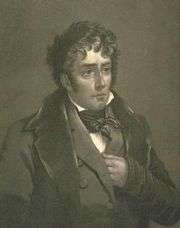|
Biografie François-René de Chateaubriand
François-René de Chateaubriand (4 septembrie 1768 - 4 iulie 1848) a fost un scriitor francez, politician și diplomat.
Este considerat fondatorul romantismului în literatura franceză.
Principala sa lucrare este "Geniul creștinismului sau Frumusețea religiei creștine" (1802), publicată ulterior în numeroase ediții.
A fost ales membru al Academiei Franceze în 1811
Engleză
François-René, vicomte de Chateaubriand(4 September 1768 – 4 July 1848) was a French writer, politician and diplomat. He is considered the founder of Romanticism in French literature.
Born in Saint-Malo, the last of ten children, Chateaubriand grew up in his family's castle in Combourg, Brittany. His father, René de Chateaubriand (1718-86), was a former sea captain turned ship owner and slave trader. His mother's maiden name was Apolline de Bedée. Chateaubriand's father was a morose, uncommunicative man and the young Chateaubriand grew up in an atmosphere of gloomy solitude, only broken by long walks in the Breton countryside and an intense friendship with his sister Lucile.
Chateaubriand was educated in Dol, Rennes and Dinan. For a time he could not make up his mind whether he wanted to be a naval officer or a priest, but at the age of seventeen, he decided on a military career and gained a commission as a second lieutenant in the French Army based at Navarre. Within two years, he had been promoted to the rank of captain. He visited Paris in 1788 where he made the acquaintance of Jean-François de La Harpe, André Chénier, Louis-Marcelin de Fontanes and other leading writers of the time. When the French Revolution broke out, Chateaubriand was initially sympathetic, but as events in Paris became more violent he decided to journey to North America in 1791. This experience would provide the setting for his exotic novels Les Natchez (written between 1793 and 1799 but published only in 1826), Atala (1801) and René (1802). His vivid, captivating descriptions of nature in the sparsely settled American Deep South were written in a style that was very innovative for the time and spearheaded what would later become the Romantic movement in France. Later scholarship has cast doubt on Chateaubriand's claim that he had been granted an interview with George Washington or whether he actually lived for a time with the Native Americans he wrote about.
Chateaubriand returned to France in 1792 and subsequently joined the army of Royalist émigrés in Coblenz under the leadership of Louis Joseph de Bourbon, Prince de Condé. Under strong pressure from his family, he married a young aristocratic woman, also from Saint Malo, whom he had never previously met, Céleste Buisson de la Vigne. In later life, Chateaubriand would be notoriously unfaithful to her, having a series of love affairs, but the couple would never divorce. His military career came to an end when he was wounded at the siege of Thionville, a major clash between Royalist troops and the French Revolutionary Army. Half-dead, he was carried to Jersey and exile in England, leaving his wife behind.
Chateaubriand spent most of his exile in extreme poverty in London, scraping a living offering French lessons and doing translation work, but a stay in Suffolk was more idyllic. Here Chateaubriand fell in love with a young English woman, Charlotte Ives, but the romance ended when he was forced to reveal he was already married. During his time in Britain, Chateaubriand also became familiar with English literature. This reading, particularly of John Milton's Paradise Lost (which he later translated into French prose), would have a deep influence on his own literary work. His exile forced Chateaubriand to examine the causes of the French Revolution, which had cost the lives of many of his family and friends; these reflections inspired his first work, Essai sur les Révolutions (1797). A major turning point in Chateaubriand's life was his conversion back to the Roman Catholic faith of his childhood some time around 1798.
Works
1797. Essai sur les révolutions.
1801. Atala.
1802. René.
1802. Génie du christianisme.
1809. Les Martyrs.
1811. Itinéraire de Paris à Jérusalem. English translation by Shoberl, Frederick, 1814. Travels in Greece, Palestine, Egypt, and Barbary, during the years 1806 and 1807.
1814, "On Buonaparte and the Bourbons," in Blum, Christopher Olaf, editor and translator, 2004. Critics of the Enlightenment. Wilmington DE: ISI Books. 3-42.
1820. Mémoires sur la vie et la mort du duc de Berry.
1826. Les Natchez.
1826. Les Aventures du dernier Abencérage.
1827. Voyage en Amérique.
1831. Études historiques.
1844. La Vie de Rancé.
1848–50. Mémoires d'Outre-Tombe.
|





